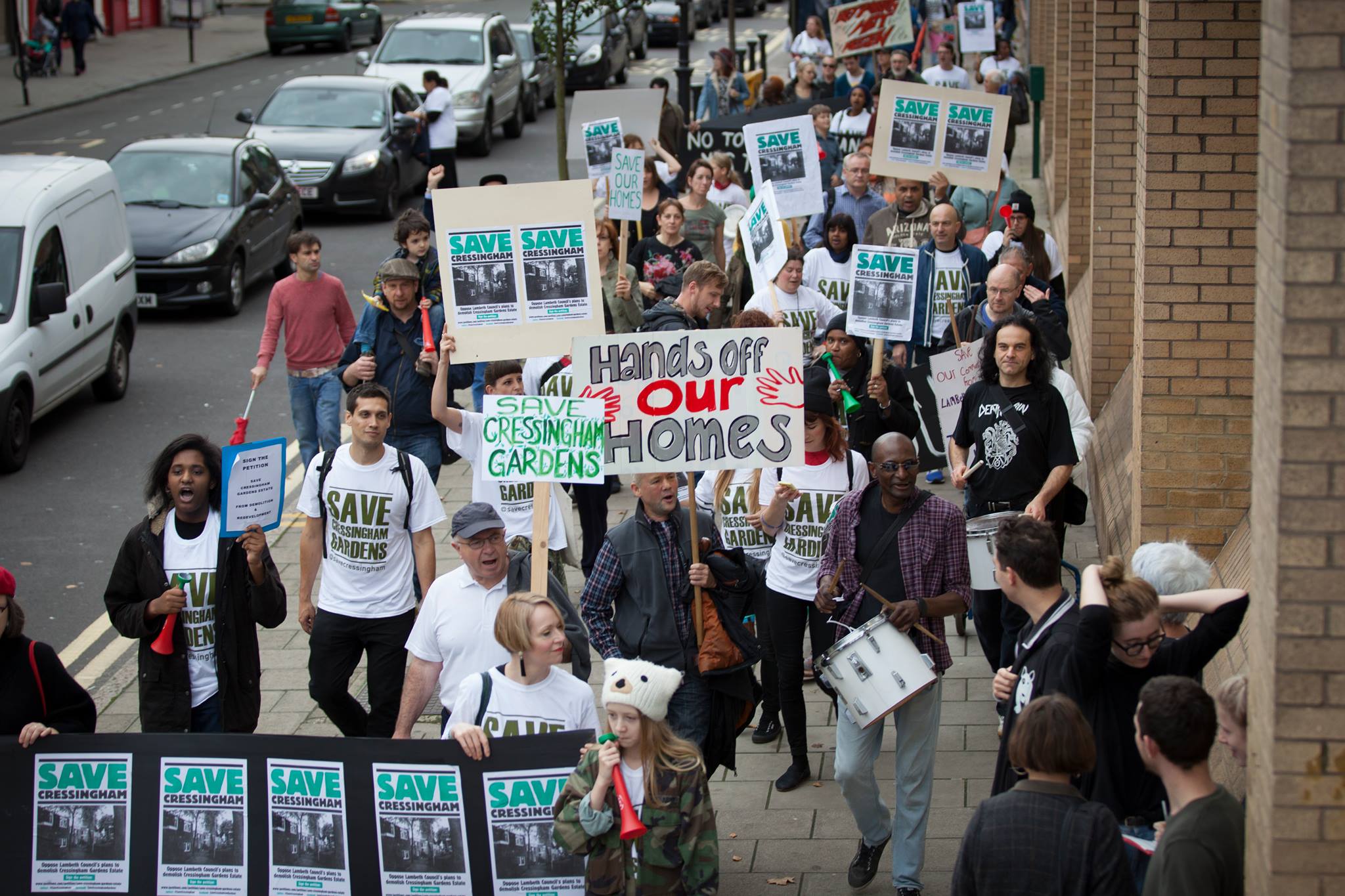Like many council estates around the country, Cressingham Gardens in Lambeth, London, has fallen into a state of disrepair, with Lambeth council claiming that they do not have the money to maintain it. Nathan Taylor reports on the campaign to save Cressingham Gardens and its residents from eviction.
The other night I attended a meeting of the residents of the London housing estate of Cressingham Gardens in Lambeth, who are now facing eviction.
Like many council estates around the country, Cressingham Gardens has fallen into a state of disrepair, with Lambeth council claiming that they do not have the money to maintain it. Three years ago, despite protests from the residents, the council announced that they were going to demolish the entire estate for “redevelopment”. They promised that the current tenants were guaranteed a place in one of the new properties once the project was completed in two or three years. However, what was hidden in the small print was that, out of nearly 150 new homes, only 26 of them will be made available at a social housing rent level; the rest will only be available at so-called “market rents” level to maximise profits. The people of Cressingham Gardens are working class people, many of them on minimum wage jobs, so the idea that they would be able to afford these high rents is ridiculous.
This is an all too familiar story that we are seeing repeated all over the country: the social cleansing of our cities and the break-up of communities that have lived together for generations. However, in response, ordinary people up and down the country are coming together in meetings such as this, determined to protect their communities and are getting politicised as a result.
Around 50 people attended the meeting. The speakers were architects and people who worked for independent housing companies, trying to draw out alternatives to the council’s redevelopment plan. Exactly how their alternatives are to be funded remains a mystery. Most of what they said I did not understand and I won’t bore anyone with details about housing law etc. But the main thing that struck me was how politicised the residents were.
One of the housing lawyer types kept reiterating that he wanted to avoid politics in his speech, to which many of the residents replied that, whether he liked it or not, this was a political situation. Many talked at length about how the Tory government was the government of the privileged – their policies on housing and public services were nothing short of an ideological attack on ordinary people.
The other interesting aspect of the meeting was that there seemed to be a universal hatred of the Labour Party who run the council. Cressingham Gardens is in the Dulwich and West Norward constituency, which is a safe Labour seat, but a notoriously right-wing one. One of the main tenant organisers said that she had been a Labour supporter from the moment that she had the legal right to vote in this country, because she was told it was the party of working people. She then laughed and said, ‘It turned out I had voted for someone to demolish my home.’
After the meeting I spoke to a couple of people and asked them what they thought of Jeremy Corbyn. They all said that they love his ideas and policies, but they considered him separate to the Labour Party. They all said they would love him to be Prime Minister, but unless there is a sharp and visible swing to the left amongst their local councillors they would never vote Labour. The bottom line is they want to protect their homes and their homes are being threatened by Labour Party councillors.
The main thing I took from this tenants meeting was the potential for working class radicalisation as a result of the housing crisis. Most of the people living in Cressingham Gardens had no real interest in politics before they were threatened with eviction. What was great about it was that over the three years since the start of the campaign, many of the tenants, who normally would have been too nervous to get up and speak in front of people, had become brilliant public speakers, just through necessity and practice. There were also many young people at the meeting who had grown up on the estate, who did not want to leave their childhood homes, and you could see the anger in them, one of them telling me “all the main parties are fucked!”
Another person I spoke to was an activist involved in the anti-poll tax movement in the 1980s. She said that at the very beginning, the poll tax movement started just through ordinary working class people meeting in community centres like the one in Cressingham Gardens, then it exploded.
Many working class people are angry about cuts to the NHS, the war in Syria, Trident, etc. However, it seems to take something that directly makes an acute difference on their quality of life to get them radicalised, like the loss of jobs due to the closing of mines and factories in the 1970s and 80s, or the daylight robbery of the poll tax.
With more and more people living in sub-standard, high rent housing, whilst working long hours in a low-pay jobs, and an increasing homeless population, the housing crisis is likely to be one of those issues that leads to a qualitative change in the working class movement. With the slowdown in the markets and a fresh capitalist crisis fast approaching, the housing crisis is only going to get worse, and the working class will be looking for a radical alternative as it becomes clearer that capitalism cannot provide society’s basic needs, such as a home for all.






